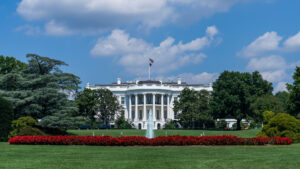WASHINGTON — Potential Republican control of at least one chamber of the US Congress sets the stage for economically risky battles in 2023 over federal spending limits and the government’s response should a recession develop.
Results of Tuesday’s election remain uncertain, with President Joseph R. Biden Jr.’s Democratic party performing better than expected and potentially in position to retain control of the Senate.
The Republican party had a better chance winning a majority in the House of Representatives, and if that happens it would likely complicate and temper Mr. Biden’s economic plans for his second two years in office — a time during which the economy will likely still be undergoing an inflation shock and adjusting to the rising interest rates imposed by the Federal Reserve to control it.
Gridlock is sometimes viewed positively by markets and the private sector, putting limits on the ability of either side to make disruptive changes to taxes, laws and regulations.
But it can also gum the wheels of basic governance and in doing so pose its own set of risks.
Congress, for example, will need to lift the limit on US debt at some point likely next year, though perhaps not until the fall. Depending on the election result, and the size of any Republican majority in the House, that has the potential to disrupt the economy at a point when Fed interest rates may well still be at their peak.
Under President Barack Obama, the GOP used debt ceiling talks to force federal spending cuts at a point when the economy was still struggling to its feet following the deep 2007 to 2009 recession, a “fiscal drag” that Fed officials bemoaned at the time as sapping already weak economic growth.
“A similar scenario could play out next year,” Goldman Sachs analysts wrote in an election post-mortem that put the odds in favor of Republican control of the House.
US stock markets were down on Wednesday, with major indexes lower by more than one percent in the early afternoon.
IT’S THE ECONOMY
Voters cited economic issues as top of mind ahead of Tuesday’s voting, with the pocketbook pain of higher inflation and rising Fed interest rates offsetting a low unemployment rate, steady job creation, and household wealth and bank accounts that remain flush from fiscal spending during the pandemic.
In the end voters punished the incumbent Democratic party less than pre-election polls suggested, even after Republicans used the campaign’s closing weeks to emphasize rising food and gas prices.
The political and economic battle over inflation remains underway, however, with a pivotal period approaching in which either the pace of price increases will abate, or the Fed will feel it necessary to raise rates even higher than currently anticipated in a fresh hit to the economy.
“Bringing supply and demand back into alignment may require still more from us, creating risk to the broader economy,” Richmond Fed President Thomas Barkin said on Wednesday.
In a recent Fed survey of bank loan officers, more than 57% of respondents put the odds of a recession in the next 12 months at 60% or more, though it was also expected to be only mild or moderate in nature.
Unless inflation were to take an unexpectedly sharp dive, that could leave the United States facing both still-rising prices, high interest rates, and shrinking output — stagflation.
It would also leave fiscal policy as the primary driver of any recession response, with decisions made more difficult by divided rule and the beginnings of what could be a tendentious presidential election cycle.
The US response to the pandemic recession in 2020, initially under Republican President Donald Trump and a Democratic Congress then later under Mr. Biden, was considered textbook in some respects — with the quick rollout of a broad safety net that asked few questions other than how to stave off a second Great Depression.
But it also may have helped trigger the current round of inflation, and has pushed US public debt to record levels.
That may mean a more reluctant fiscal response to any coming downturn.
“We continue to believe divided government in 2023 will underscore the shift from fiscal tailwinds to headwinds, and will likely result in a lack of fiscal support during our forecasted recession,” analysts from Nomura wrote. — Reuters

